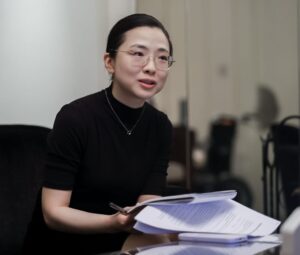By Yuan Tian
The United Nations Competitive Examinations for Language Positions (CELP), often considered a “killer” exam, has become increasingly challenging in recent years. Today’s candidates must process and deliver significantly denser information as compared to a decade ago. In this article, we are pleased to feature Pei (Peggy) He, who passed the interpretation exam in 2022. I sat down with Peggy and talked about her journey, the challenges she faced, and the strategies and techniques that helped her succeed.

Based in Shanghai, Peggy holds a master’s degree in interpretation from Shanghai International Studies University, focusing on theoretical aspects. She holds another master’s degree in Conference Interpretation from the Middlebury Institute of International Studies at Monterey, with emphasis on practical work.
Filled with immense challenges along the way, Peggy’s preparation journey was nothing short of extraordinary. While still caring for her one-year-old, she spent seven months preparing for the exam, three of which coincided with COVID lockdown in Shanghai. Surrounded by numerous quarantine-related inconveniences, ensuring sufficient study time required creativity and determination in managing her time and juggling her responsibilities.
Peggy rose at 5 a.m. each day to ensure three hours of study before her baby woke up at around 8 a.m. “I received tremendous support from my husband and mother. Their encouragement was instrumental in my success,” Peggy says, deeply grateful for her family’s support. “Without their help, I could not have succeeded.”
With a decade of work experience in interpretation, Peggy shares her expertly honed preparation techniques, which can be distilled into three key steps.
Step 1: Sight Translation
Given the uniqueness of the UN context, building a large vocabulary is essential. While written translation facilitates vocabulary building, it often differs significantly from interpretation in terms of sentence formulation. Sight translation serves as a helpful bridge to interpreting the subject matter of international affairs. For practice, resources such as the Permanent Mission of the People’s Republic of China to the UN are valuable references.
Step 2: Ease into Simultaneous Interpreting
Once comfortable with UN topics, the next step is to start simultaneous interpretation exercises. The initial practice sessions may feel challenging, but they are essential for laying a strong foundation. To make the process more manageable, try starting with shorter segments—three-minute exercises—and work up to longer ones of five, eight, or even twelve minutes. This gradual approach is helpful for building confidence over time.
Chinese to English
The website of the Permanent Mission of the People’s Republic of China to the UN hosts many published speeches. By referencing the dates, titles, speakers and themes of these written speeches, test takers can locate the corresponding on-site videos on UN Web TV. It’s important to note that the videos cover entire sessions featuring multiple speakers, so some effort is needed to pinpoint the exact sections that correspond to the written speeches.
English to Chinese
While speeches by the UN Secretary-General might sometimes have Chinese translations available on the UN official website, translated texts are often hard to find for English-to-Chinese practices. As an alternative, you can explore remarks on the websites of other countries’ missions to the UN and select Chinese as the audio language in the UN Web TV video player to hear how UN interpreters render these speeches. In fact, one of Peggy’s key learning methods involves listening to UN interpreters and analyzing their interpretation strategies.
Step 3: A Year of Persistent Daily Practice
Peggy stresses the importance of daily practice in both language directions and weekly theme variation. Searching for materials by committee names is a great way to diversify your practice content. In another interview conducted by the Middlebury Institute of International Studies at Monterey, she mentions, “Part one of the exam was the most challenging. It took seven months of daily intensive practice to familiarize myself with UN discourse and subject matters.”
 At the time of releasing this interview article, Yuan Tian is taking her gap year and has completed her internship as a simultaneous interpreter at a Chinese multinational company in Fujian province (China). Yuan is a first-year interpretation student at the Middlebury Institute of International Studies at Monterey (MIIS). During her study, she serves as a Graduate Assistant at both the MIIS James Martin Center for Nonproliferation Studies and the MIIS Intercultural Competence Program. Yuan’s language combinations include Chinese and English (in both directions) and German to English. Originally from China, she completed her undergraduate degree in Germany and gained valuable exchange experience in the UK, Russia, and Spain. Her diverse cultural and academic background enriches her studies and professional endeavors.
At the time of releasing this interview article, Yuan Tian is taking her gap year and has completed her internship as a simultaneous interpreter at a Chinese multinational company in Fujian province (China). Yuan is a first-year interpretation student at the Middlebury Institute of International Studies at Monterey (MIIS). During her study, she serves as a Graduate Assistant at both the MIIS James Martin Center for Nonproliferation Studies and the MIIS Intercultural Competence Program. Yuan’s language combinations include Chinese and English (in both directions) and German to English. Originally from China, she completed her undergraduate degree in Germany and gained valuable exchange experience in the UK, Russia, and Spain. Her diverse cultural and academic background enriches her studies and professional endeavors.
Yuan’s LinkedIn: http://linkedin.com/in/yuant-zh-de-en
Email address: YuanTn@outlook.com
Edited by Fang Sheng and Sijin Xian.
Thank you Yuan and Yifeng team for this great interview! Peggy achievements and insights are a great source of inspiration for other CLD members. 👍